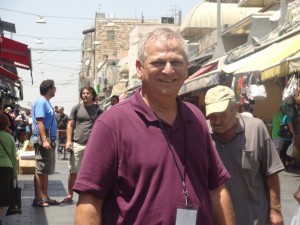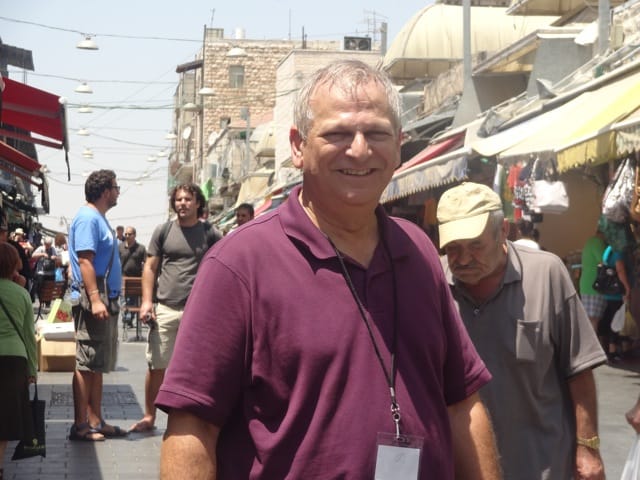
Joel Rubin
Motti is a 28-year-old Orthodox Jew, trying to find himself in a country where seemingly half the population respects and appreciates his total devotion to his faith and the study of its texts; and the other half despises him for not contributing to the general welfare by paying taxes, working a steady job or serving in the military.
Israel has challenges all around it, such as 380-million mostly unfriendly neighbors living in tribal societies in the throes of civil unrest. But the trip that 50 male “community leaders” from Tidewater took to the Jewish State the next to last week in July revealed to me that the gravest concern is one the citizens could solve themselves, if only they could be more tolerant of each other’s significantly different approaches to life and faith.
Motti represents a small break in the impasse. He came to a program housed in Tel Aviv called Shachar, run by the JDC (Joint Distribution Committee or “Joint”), seeking guidance in securing a financial future for himself, his wife and four (so far) children. The money that Moti, clad in a black hat and coat and with curled payis hanging below each ear, receives from the government to subsidize his life of Orthodox scholarship was not enough to support his family. He asked the Shachar staff to help him transition into the Army, which was willing to accept him on his terms—no guns, no haircut, no weekend or even weeknight duty. Motti is now in uniform Monday through Friday, learning skills that he can take into the private sector when his tour of what would be mandatory service for less Orthodox Jews in Israel ends. “The world has opened up to me,” he said through a translator.
Another young man who spoke to us wanted to work in the private sector, not be a soldier. Shachar evaluated his limited skills (Haredi male Jews stop their secular studies after the eighth grade, the girls continue through the 12th, making them more employable) and determined that he had the gift of gab. He is now in a sales position with a financial services firm. In both cases, the men had to break the news of their decisions to their Ultra-Orthodox parents and rabbis. “I was the first one in my family to do this,” said Motti. “Fortunately they gave me their blessing.”
The staff at Shachar says what they are doing is so sensitive that few people in Israel know the program exists, even though since 2006, JDC has eased the entry of more than 17,000 Haredim into gainful employment, which is important since the poverty rate among that population is 55%. Because the Joint did such an admirable job reinvigorating Judaism in Displaced Persons Camps in Europe after World War II, said Chaviva Eisler of JDC’s Employment Center, the organization continues to enjoy the trust of many religious Jews. But few actually follow Motti’s path, causing great resentment among the less observant and a current heated debate over whether to require Ultra-Orthodox Jews and Palestinian Israelis to perform military or community service. The Supreme Court has ruled that Tal Law, which authorizes the current exemption, is unconstitutional. But it remains on the books, and it will take the Knesset and Prime Minister to force the issue. To date they haven’t.
During our four days and three nights in Israel, we heard much hand wringing about the demographic cliff Israel is approaching, as large Haredi families, with one or no working spouses, become an increasing financial burden on secular Israelis who must support them and every other government function, including a sophisticated military, with their taxes. “This is not the Israel your parents thought it would be,” said Alan Pinkas, a former Israeli Consul General to New York City. Jerusalem, both the actual and religious capital of Israel, is the poorest city in the country, according to one vice mayor who met with us. One would think it would also be the least safe, given its diverse population, but our day and night there, which included a few glorious minutes at the Kotel, were as memorable as they were uneventful.
We might have expected a bit more trouble at the West Bank’s heavily fortified Ramallah Checkpoint. Thanks to Art and Steve Sandler and David Brand, who used their considerable connections to gain us access to people and places typically off limits or unavailable to most visitors, we had the opportunity to watch the processing of Palestinians, some displaying angry scowls while showing their ID’s so they could travel outside their towns. Staring at them as they emerged from the screening process each day is the “Fence,” a large concrete fortress that stretches through much of the disputed territory, keeping out those who would do Israelis harm.
Security is a constant topic of discussion. While we were in the country, the issue of Syrian chemical weapons, and whether they would fall into the wrong hands as the Assad regime collapses, was in the headlines. So was, of course, Iran. Aluf Benn, editor of Haaretz, one of Israel’s most prominent dailies, predicted his government will not go to war over Iran’s nuclear plans, at least not this summer in the heat of a U.S. Presidential election. “The problem is the day after an attack,” said Benn, “and uncertainty over what Barack Obama would do. And we are not sure about Mitt Romney either.” Meanwhile Benn believes Israel’s status in Europe and America is stronger than it has been in recent years, because of the uncertainty over who will ultimately rule in Egypt, Syria, Libya, Jordan et al. “The Western governments now understand there are more important things to worry about than West Bank settlements,” he said. And Ambassador Pinkas opined that Iran may actually be more concerned with Pakistan than Israel, in part because the “Persians believe the Arabs have contaminated Islam.”
Even with all this, however, it is hard not to feel optimistic when you are in Israel. Inventors are securing patents, high tech companies line the interstates around Tel Aviv, scientists win Nobel Prizes and entrepreneurs make advances in everything from medicine to agriculture. (Yes, we each planted a tree, adding to the 318-million placed in the ground by pioneers and other visitors over the past 64 years. We also enjoyed perhaps the best domestically grown fruits and vegetables, not to mention amazing meals, on the planet). We met current Israeli Navy seals and former ones who are helping turn around the lives of struggling youngsters so they can gain admission into the IDF. We saw busy streets and restaurants, despite an economy saddled with increased unemployment and costs to support disadvantaged populations, including tens of thousands of Sudanese and other African refugees who have come to the Jewish state, seeking asylum.
We heard from the passionate Avraham Infeld about why we Jews have much to learn and share, from one of the owners of a “Better Place,” the startup firm that is developing the infrastructure for what they believe is the coming electric car revolution, and from a female Reform Rabbi who is angry that she must adapt to a religious state where Orthodox soldiers walked out of a performance by a group of women singers and where some weddings she conducts must be done off shore.
At the end we accomplished the major goal of the mission by bonding as a group. Our directive was to take the relationships that bloomed in the holy land back to Hampton Roads and build a community that can sustain itself and Israel, too.
by Joel Rubin

